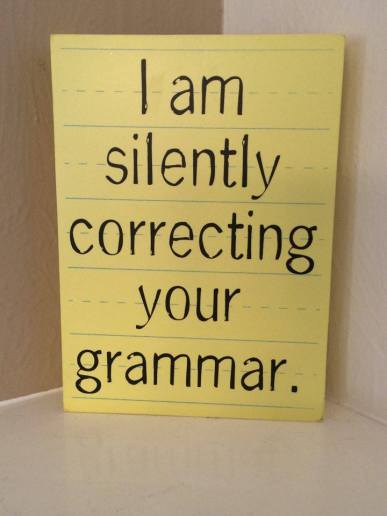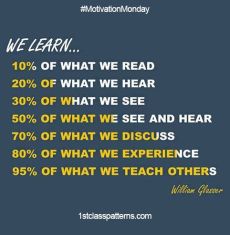Yesterday, I read this great article by Nat Russo about how important it is for writers to master the craft before we start defending our style. Click on his name to read the whole thing (which I recommend), but here’s a chunk of it:
You’ve heard people do this. When you offer constructive criticism, they’ll say things like this:
- “I’m stringing multiple adverbs together here because that’s my style.”
- “I’m going to pepper my paragraphs with ellipses and EM-dashes because that’s my style.”
- “Proper comma usage isn’t my style.”
- “Plot and structure cramp my style. I need to be free of those arbitrary constraints.”
What these writers don’t realize is before they can strike off in their own direction as a master of the craft, they actually have to MASTER THE CRAFT.
Basically, you have to know the rules of writing before you can break them.
The article got me thinking about how I learned the rules of writing, and I realized how I learned is probably different from how most other writers learned. My author friends, family…basically anyone who knows me personally will tell you I’m a stickler when it comes to clean writing. That means I like it when grammar rules are followed. My mom gave me this sign for my birthday one year. I display it proudly in my dining room.

Everyone who sees it says this: That is so you.
I saw a picture frame in Hobby Lobby once that said “Grandma’s Are The Best” or something – I don’t remember what it really said, because I was stuck on the unnecessary apostrophe. I mean, how many eyes did that thing pass before it hit the shelf? Come on.
Anyway, the point is I know the rules, and I learned them because I taught them.
I taught in second- and third-grade classrooms for ten years before I transitioned to a reading/writing interventionist position for three years. During my time as a classroom teacher, my room was a “pilot class” for a new writing curriculum that I thought was effective at teaching the kids how to write coherently. I had third graders writing gorgeous paragraphs in a variety of genres. But the curriculum was ultimately dumped because while it taught the kids to write, it didn’t teach them how to pass standardized state tests. That’s a different post for a different day.
I mention that curriculum because much of what I learned about the basics of writing came from that. Yes, it was designed for elementary-aged students. But it’s been a while since most of us were that age, and good writing skills fall into the “If you don’t use it, you lose it” category. The items I’m about to mention are things I see often in my critique group and every single freaking day in social media. My eyelids twitch, but that might be an unrelated matter.
From teaching, I learned (among other things):
- The differences between simple, compound, complex, and compound/complex sentences and how to write them.
- Where to put a comma in a compound predicate (plot twist: you don’t put a comma in a compound predicate).
- What a comma splice is and how to fix it.
- How to use new paragraphs to discuss new ideas.
- The importance of sentence fluency.
- What a fragment is and how to fix it.
 These items are ingrained into my head because I taught them. Instead of spending time figuring out where the comma goes, I can work on story elements like developing characters and making sure there aren’t plot holes.
These items are ingrained into my head because I taught them. Instead of spending time figuring out where the comma goes, I can work on story elements like developing characters and making sure there aren’t plot holes.
What does this mean for you? I know most of us didn’t teach writing as a career, but that doesn’t mean there aren’t outlets to impart our knowledge. My fellow writers in the critique group teach me something every time I post a chapter, and I pass along what I know in my comments for their chapters. My favorite comments in my chapters say something to the effect of, “I just learned on such and such website that this is the correct way to use an ellipse.” I know that in teaching me that skill they learned, they are more likely to remember it forever and not have a bad habit creep into their work.
Yes, you can improve your skills as a writer from reading a book about it or talking to another writer. Go to webinars and conferences. Those are all great. But if you want to solidify your new skills quickly, figure out a way to teach them to someone else.
Do you have an outlet to teach what you learned? If so, tell us about it in the comments. If not, feel free to ask for recommendations!

Pingback: What Did You Like? 2016 In Review | Allison Maruska
Yep. I was a teacher for 30 years and I learned more by teaching then I did as a student. That is why I created lessons where my students were organized into teams to plan lessons and then teach them to the class while I sat in the back and observed and graded the lesson based on what they taught and the material they created for the rest of the class to learn from. If a lesson was not that good, the team was allowed to re-plan it with new material and teach it again. Once a team received their points, they were allowed to negotiate how to divide up those points that then turned into a letter grade. It was interesting to see students voting unanimously to award enough points to the hardest working student in the team to earn an A+ while others only earned an F, a D or C-. It was rare that a student would earn an F from his or her peers but it did happen and when it did, I’d call the student who earned the F to my desk and ask him if he wanted to protest and make a case that he should have earned a passing grade. Not once, did one of the failing students protest. They always admitted that they had done nothing.
Of course we didn’t do this all the time. Sometimes, the kids organized into read around groups to read and rate on a rubric every essay every student in one of my other classes wrote. We even created the rubrics as a class—I didn’t just create and force a teacher made rubric on them—so the students would understand what the rubric meant that they were using in their teams to evaluate those essays that didn’t come with student names on them but ID numbers, and only I knew what class those essays came from. If there was a word in the rubric students didn’t understand, then we talked about what that word meant if if there was a better word to use in its place.
LikeLiked by 1 person
Wow, those are awesome strategies! It’s a good thing you lasted 30 years in the profession. 🙂
LikeLike
Thank you. Over the years, I found that the most productive learning taking place in my classroom, happened when students were more involved with the teaching process. This is something bubble tests do not measure.
LikeLike
I’m guilty of using “And” at the beginning of a sentence. And I’m also guilty of calling it “my style”, because I KNOW I’m breaking a rule. But (another one!) I also agree with you completely that the only way you can really learn grammar is by teaching it yourself. Or (Ha!) by learning a new language and being pulled out of your linguistic comfort zone completely. 😉 Great blog post, Allison.
P.S. I totally hear you on the “Grandma’s” thing. I’m also seeing major brands making errors in social media, writing “whose” when it should be “who’s”… Slays me! (“Whose gonna do something about that for once and for all!” I mean, you really couldn’t afford a quality copy editor?)
LikeLiked by 1 person
Your comment made me laugh! 😀 I often start sentences with conjunctions too. Sometimes I have to go back and take some out!
LikeLiked by 1 person
We writers are always walking the tightrope between maintaining our voice and falling victim to our crutches. 🙂 Glad to make you laugh. Happy Sunday!
LikeLiked by 1 person
I love to tell this story: My husband was getting his masters while I was finishing my bachelors and we both had to take the same english exam. It had two parts; grammar and then an essay. He got a perfect score on the grammar part but did so bad on the essay he barely passed. I got the lowest passing score on the grammar but did so well on the essay that I scored high enough to waive the class the test was for. That’s why he line edits what I write. LOL
LikeLiked by 1 person
Sounds like a perfect team to me! 🙂
LikeLiked by 1 person
I grew up with academically-inclined parents who were sticklers about grammar, word use, accurate quote attribution. You name it, they knew how to do it properly, and I was expected to do so as well. Fast forward to the world of personal blogging where I discovered that I enjoy the rebellious feeling of not always being proper! This is probably a sad insight into my psyche, but I sure do like saying things wrong. Once in a while. 😉
LikeLiked by 1 person
Not sad at all! It means you’ve mastered the rules and can confidently break them in a way that enhances your message. High five! 🙂
LikeLiked by 1 person
Thank you. That’s how I like to think about my writing. 😉
LikeLiked by 1 person
Had to smile…your piece is awash with learned and in a recent piece of mine I used learnt…both right in the context of the country we were taught in. I hold my hand up to the misuse of the apostrophe…I always feel I get it wrong even when I get it right. Feel free to rip into my recent blog efforts…I have a thick skin.
LikeLiked by 1 person
Well I try to limit the amount of ripping I do, but I’ll help out if I can. 🙂 That said, I definitely need to catch up on reading my blog feed…
LikeLiked by 1 person
Just think of me as practice for ripping into Dan…
LikeLiked by 2 people
Oh-oh! I think I am teetering on the edge of being an ellipses and EM-Dash abuser.
LikeLiked by 2 people
Nooo!! 😉
LikeLiked by 1 person